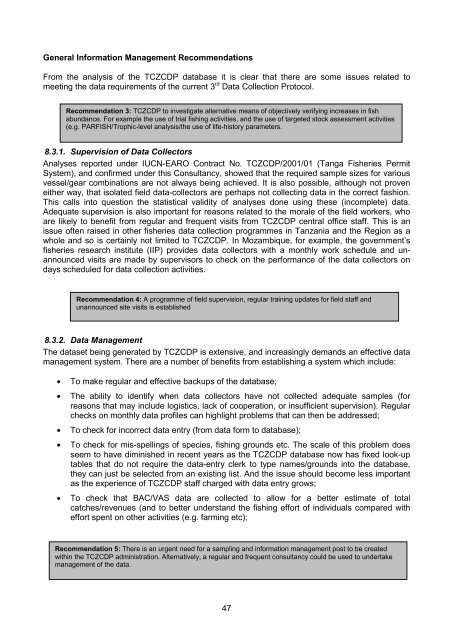Create successful ePaper yourself
Turn your PDF publications into a flip-book with our unique Google optimized e-Paper software.
General Information Management Recommendations<br />
From the analysis of the TCZCDP database it is clear that there are some issues related to<br />
meeting the data requirements of the current 3 rd Data Collection Protocol.<br />
Recommendation 3: TCZCDP to investigate alternative means of objectively verifying increases in fish<br />
abundance. For example the use of trial fishing activities, and the use of targeted stock assessment activities<br />
(e.g. PARFISH/Trophic-level analysis/the use of life-history parameters.<br />
8.3.1. Supervision of Data Collectors<br />
Analyses reported under <strong>IUCN</strong>-EARO Contract No. TCZCDP/2001/01 (<strong>Tanga</strong> <strong>Fisheries</strong> Permit<br />
System), and confirmed under this Consultancy, showed that the required sample sizes for various<br />
vessel/gear combinations are not always being achieved. It is also possible, although not proven<br />
either way, that isolated field data-collectors are perhaps not collecting data in the correct fashion.<br />
This calls into question the statistical validity of analyses done using these (incomplete) data.<br />
Adequate supervision is also important for reasons related to the morale of the field workers, who<br />
are likely to benefit from regular and frequent visits from TCZCDP central office staff. This is an<br />
issue often raised in other fisheries data collection programmes in Tanzania and the Region as a<br />
whole and so is certainly not limited to TCZCDP. In Mozambique, for example, the government’s<br />
fisheries research institute (IIP) provides data collectors with a monthly work schedule and unannounced<br />
visits are made by supervisors to check on the performance of the data collectors on<br />
days scheduled for data collection activities.<br />
Recommendation 4: A programme of field supervision, regular training updates for field staff and<br />
unannounced site visits is established<br />
8.3.2. Data Management<br />
The dataset being generated by TCZCDP is extensive, and increasingly demands an effective data<br />
management system. There are a number of benefits from establishing a system which include:<br />
• To make regular and effective backups of the database;<br />
• The ability to identify when data collectors have not collected adequate samples (for<br />
reasons that may include logistics, lack of cooperation, or insufficient supervision). Regular<br />
checks on monthly data profiles can highlight problems that can then be addressed;<br />
• To check for incorrect data entry (from data form to database);<br />
• To check for mis-spellings of species, fishing grounds etc. The scale of this problem does<br />
seem to have diminished in recent years as the TCZCDP database now has fixed look-up<br />
tables that do not require the data-entry clerk to type names/grounds into the database,<br />
they can just be selected from an existing list. And the issue should become less important<br />
as the experience of TCZCDP staff charged with data entry grows;<br />
• To check that BAC/VAS data are collected to allow for a better estimate of total<br />
catches/revenues (and to better understand the fishing effort of individuals compared with<br />
effort spent on other activities (e.g. farming etc);<br />
Recommendation 5: There is an urgent need for a sampling and information management post to be created<br />
within the TCZCDP administration. Alternatively, a regular and frequent consultancy could be used to undertake<br />
management of the data.<br />
47
















